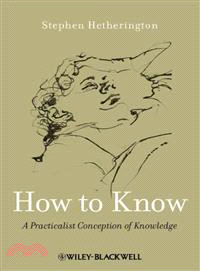商品簡介
- Presents a philosophically original conception of knowledge, at odds with some central tenets of analytic epistemology
- Offers a dissolution of epistemology’s infamous Gettier problem — explaining why the supposed problem was never really a problem in the first place.
- Defends an unorthodox conception of the relationship between knowledge-that and knowledge-how, understanding knowledge-that as a kind of knowledge-how.
作者簡介
目次
1 The Standard Analytic Conception of Knowledge.
1.1 ‘Knowing is a Belief State (or Something Similar)’.
1.2 ‘Knowledge is Well Supported’.
1.3 ‘Knowledge is Absolute’.
1.4 ‘Knowing Includes not being Gettiered’.
1.5 ‘Knowledge-that is Fundamentally Theoretical, not Knowledge-how’.
1.6 The Standard Analytic Conception of Knowledge.
1.7 Prima Facie Core Problems.
1.7.1 The justificationism problem.
1.7.2 The Gettierism problem.
1.7.3 The theoreticalism problem.
2 Knowledge-that as Knowledge-how.
2.1 The Rylean Distinction.
2.2 The Rylean Argument.
2.3 Wittgenstein on Rule-following.
2.4 The Knowledge-as-Ability Hypothesis.
2.5 Justification.
2.6 Grades of Knowledge.
2.7 Denying Knowledge-Absolutism: Clear Precedents.
2.7.1 Augustus de Morgan.
2.7.2 Rudolf Carnap.
2.7.3 Norman Malcolm.
2.7.4 W. V. O. Quine.
2.7.5 Jaakko Hintikka.
2.7.6 David Lewis.
2.7.7 Alvin Goldman.
2.7.8 Christopher Peacocke.
2.7.9 Ernest Sosa.
2.7.10 Baron Reed.
2.8 Denying Knowledge-Absolutism: Possibly only Apparent Precedents.
2.8.1 Locke.
2.8.2 Russell.
2.8.3 Contextualism.
2.9 Sceptical Challenges.
2.10 Sceptical Limitations.
2.11 Epistemic Agents.
2.12 Abilities.
2.13 Rylean Mistakes.
2.14 Conclusion.
3 Gettier? No Problem.
3.1 Gettier Situations.
3.2 A Counter-Example to ‘Gettier’s Official Result’.
3.3 Ordinary Gettiered Knowledge.
3.4 A Meta-Gettier Problem.
3.5 Objections Answered.
3.6 Gettier-Luck as Veritic Luck?
3.7 Gettier-Luck is not Veritic Luck.
3.8 Gettier-Luck is Combinatorial Luck.
3.9 Combinatorial Luck: Applications.
3.10 Knowing in a Combinatorially Lucky Way.
3.11 Gettier-Holism Versus Gettier-Partialism.
3.12 Combinatorial Safety.
3.13 Combinatorial Gradational Safety.
3.14 Epistemological Privilege and Epistemological Empathy.
3.15 Gettier Situations and Sceptical Situations.
3.16 Timothy Williamson.
4 Is this a World where Knowledge has to Include Justification?
4.1 Justificationism, Broadly Understood.
4.2 The ‘Causally Stable World’ (CSW) Thesis.
4.3 Knowledge Within Causally Fluky Worlds.
4.4 Knowledge as Putatively Pervasive.
4.5 Non-tethering Justification.
4.6 Linguistic Intuitions.
4.7 Kinds of Intension.
4.8 Conditional Justificationism.
4.9 Knowledge Within Different Possible Worlds.
4.10 Wholly General Justificationism.
4.11 A Thin or Minimal Concept of Justificationism.
4.12 Knowledge Within Causally Semi-fluky Worlds.
4.13 Evidence and Counter-Evidence.
4.14 Timothy Williamson.
5 Knowledge-that as How-Knowledge.
5.1 Knowing How it is that p.
5.2 How-Knowledge that p and Gradualism.
5.3 Degrees of Knowledge and Degrees of Belief.
5.4 How-Knowledge that p and Truthmakers.
5.5 Knowledge that p and Gradualism.
5.6 Knowledge-Gradualism’s Central Concept.
5.7 Can there be Minimal Knowledge?
5.8 Minimal Knowledge as Foundational Knowledge.
5.9 Knowledge-Gradualism: Closure and Scepticism.
5.10 Knowledge-Gradualism: Content Externalism and Self-Knowledge.
5.11 How not to Argue for Knowledge-Absolutism.
5.12 Linguistic Evidence: Igor Douven.
5.13 Linguistic Evidence: Jason Stanley.
5.14 How-Knowledge-how that p.
5.15 Knowing as Understanding?
6 A Practicalist Conception of Knowledge.
6.1 This Book’s Theory: A Summary and a Name.
6.2 Core Problems Evaded.
6.3 Further Practicalist Reconceptions.
6.4 A Predictive Practicalism?
6.5 J. L. Austin on ‘Trouser-words’.
6.6 Wittgensteinian Certainty — Generalised.
References.
Index.
主題書展
更多書展本週66折
您曾經瀏覽過的商品
購物須知
外文書商品之書封,為出版社提供之樣本。實際出貨商品,以出版社所提供之現有版本為主。部份書籍,因出版社供應狀況特殊,匯率將依實際狀況做調整。
無庫存之商品,在您完成訂單程序之後,將以空運的方式為你下單調貨。為了縮短等待的時間,建議您將外文書與其他商品分開下單,以獲得最快的取貨速度,平均調貨時間為1~2個月。
為了保護您的權益,「三民網路書店」提供會員七日商品鑑賞期(收到商品為起始日)。
若要辦理退貨,請在商品鑑賞期內寄回,且商品必須是全新狀態與完整包裝(商品、附件、發票、隨貨贈品等)否則恕不接受退貨。























